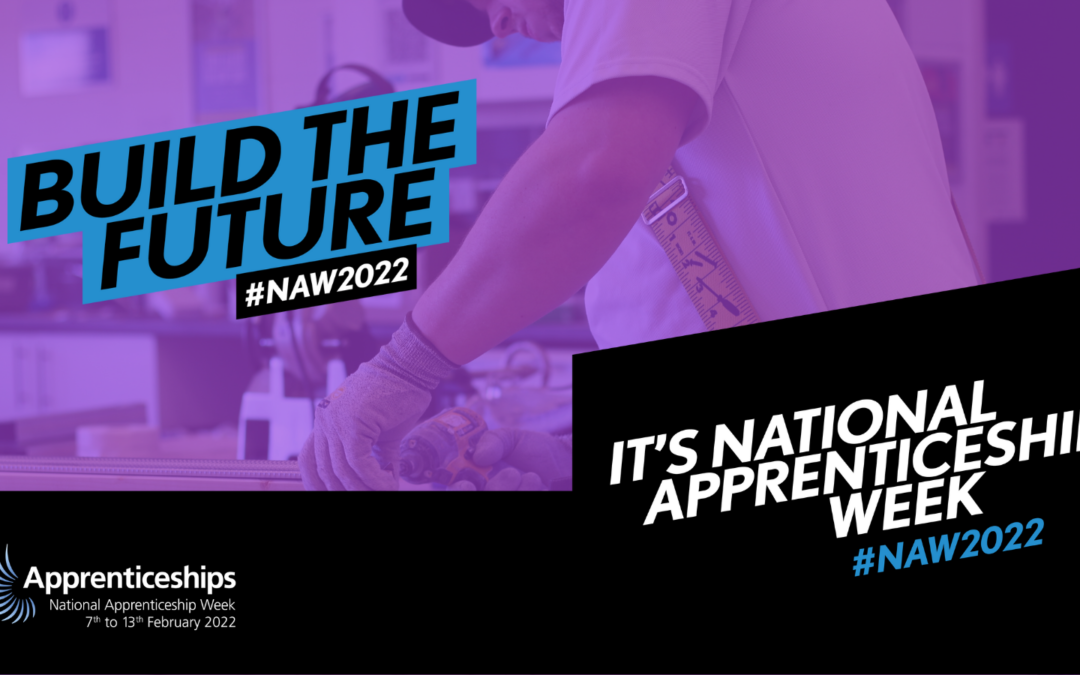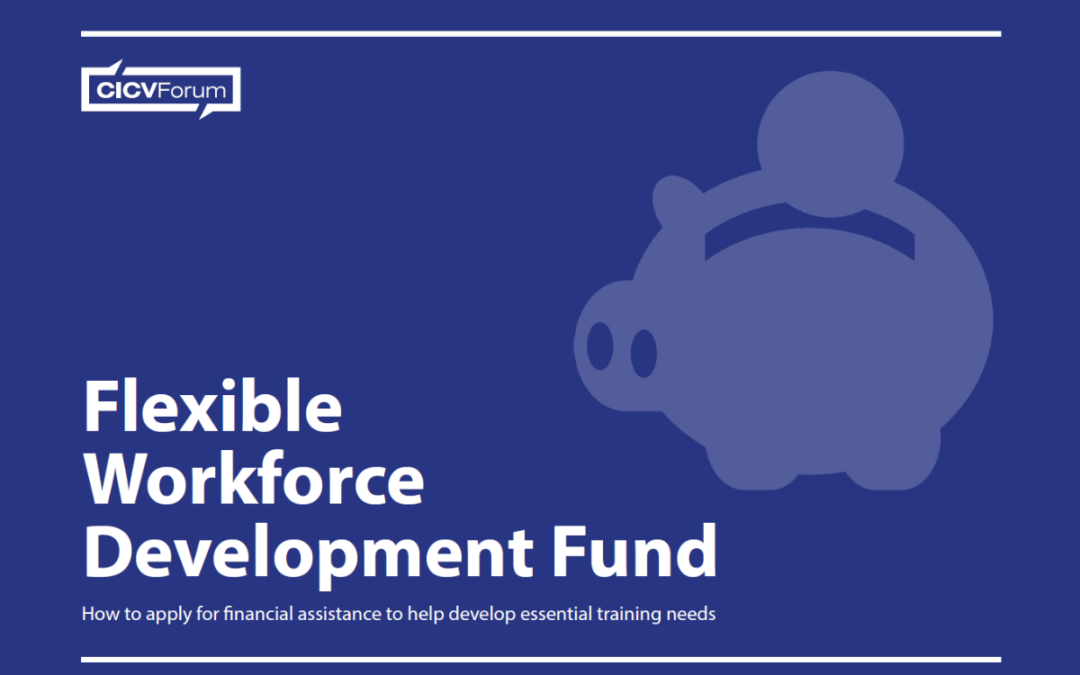
by Clair Mooney | Nov 25, 2021 | Skills
The deadline for employers to apply for the incentive payment for new apprentices hired between April and September 2021 is fast approaching. Eligible employers must apply for their incentive payment by 30 November 2021.
- how to apply video including a walk through of the steps to take within the Apprenticeship service.
- how to apply guide including when to apply, steps to take before applying, how to apply and what happens after applying.
- guidance page including eligibility, how the payment can be used and when payments are made.

by Clair Mooney | Nov 23, 2021 | Skills
The theme for the 15th annual National Apprenticeship Week has been announced today.
The National Apprenticeship Week 2022 theme of ‘Build the Future’ continues from 2021, and focuses on the benefits apprenticeships can have on individuals, businesses, and local communities and a toolkit on how to get involved is now available.
The theme of “Build the Future” continues for its second National Apprenticeship Week (NAW), which will take place between 7 and 13 February 2022.
The 15th annual week-long celebration will take place across England, encouraging individuals of any age to reach their career goals by building their skills and knowledge through an apprenticeship.
George Swann FIS Skills and Training Lead said
“National Apprenticeship Week showcases the benefits of apprenticeships for the UK economy, now that England has made apprenticeships available to individuals of any age it allows employers to invest in upskilling existing employees as well as securing the future of their organisations by taking on new entrants. With over 100 construction apprenticeships listed on the Institute for Apprenticeships and Technical Education website: Apprenticeship Standards Construction and incentive payments of up to £4000 for each apprentice an employer takes on, it is a good time to review your organisations succession plans. If you have apprentices please get involved in this and promote careers in the Finishes and Interiors Sector, if you have been thinking about taking on or putting your existing employees through an apprenticeship the information contained in this article should help you come to an informed decision. If you need further information, advice or guidance please give FIS a call on 0121 707 0077 or email info@thefis.org
Peter Mucklow, Director, Apprenticeships, Education and Skills Funding Agency said:
National Apprenticeship Week is a fantastic opportunity to celebrate the many benefits that apprenticeships bring to employers, individuals and the wider economy.
Apprenticeships build skills supply now and for the future, and form an important part of many organisations’ recruitment, skills and business strategies. We want employers to showcase how they are realising the return on their investment when apprentices are brought into the business. Apprenticeships offer outstanding access to skilled careers across a wide range of occupations and industries. We want current apprentices from all sectors and of all ages to get behind the Week and to demonstrate the positive impact of apprenticeships on their careers, families and communities.
I encourage employers, providers, partners, and apprentices to begin planning for National Apprenticeship Week 2022 now so we can spend the week collectively celebrating the impact of apprenticeships on individuals and our great businesses and public services.
To support National Apprenticeship Week 2022 individuals, employers, training providers and communities can get involved by encouraging everyone to consider how apprenticeships can help #BuildTheFuture. A toolkit is available to support the apprenticeship community with planning their activity for National Apprenticeship Week 2022.
Download the toolkit from apprenticeships.gov.uk
Keep up to date with National Apprenticeship Week 2022 updates by following @Apprenticeships on Twitter and Apprenticeships on LinkedIn and use the hashtags #NAW2022 and #BuildTheFuture on social media activity.
To find out more about apprenticeships, visit: www.apprenticeships.gov.uk.

by Clair Mooney | Nov 19, 2021 | Skills
On Monday, during the second reading of the Skills and Post-16 Education Bill, Education Secretary, Nadhim Zahawi, announced that level 3 qualification reforms were being slowed down to allow the sector more time to prepare for the changes. As a result, qualifications will not be defunded until 2024 at the earliest, rather than 2023 under the original timetable.
Following a two-stage level 3 and below review, launched in March 2019, DfE announced it would strip public funding from “poor quality” level 3 qualifications which overlap with T Levels or A-levels.
The policy change follows a petition from the Protect Student Choice campaign, a coalition of FE and skills sector organisations led by the Sixth Form Colleges Association, which has been calling for the plans to be reversed or slowed down.
Nadhim Zahawi revealed the exit requirements for English and maths in T Levels will be removed. During the reading, he told MPs: “I am clear that T Levels and A-levels should be front and centre of the level 3 landscape. But I am also convinced that we need other qualifications alongside them, many of which currently exist, that play a valuable role in supporting good outcomes for students. It is quite likely we will see many BTECs and other similar applied general style qualifications continuing to play an important role in 16 to 19 education, for the foreseeable future. Our reforms to the qualifications landscape are rightly ambitious, but we know that we would be wrong to push too hard and risk compromising quality. That is why I am announcing we have decided to allow an extra year before our reform timetable is implemented.”
It means that qualifications affected by the cull will now not be defunded until 2024 at the earliest, compared to the original plan of 2023.
The Education Secretary also confirmed government will consult on proposals for reform of qualifications at level 2 and below later this year, to ensure learners have clear lines of sight to level 3 apprenticeships, traineeships and employment.

by Clair Mooney | Nov 19, 2021 | Skills
The Institute for Apprenticeships and Technical Education (IfATE) is holding a ‘mini consultation’ as part of the route review of construction. The consultation seeks stakeholder views on the occupations currently represented on the occupational map for construction.
The finishes and interiors sector currently has three apprenticeships standards aligned to core trade occupations with two options in each:
- Interior Systems Installer ST0388 with options for Dry Lining and Ceilings and Partitions.
- Plasterer ST0096 with options for Fibrous and Solid Plastering.
- Carpentry and Joinery ST0264 with options for Site Carpenter and Architectural Joinery
The occupational map also includes apprenticeships aligned to the finishes and interiors sector such Painting and Decorating, Construction Site Supervisor, Design and Surveying.
Comments received to date indicate concerns related to the Drylining requirements in the Plasterer apprenticeship, duties 10 and 11 (Drylining fixing, boarding and finishing), which detract from the moulding and trowel skills needed by a plasterer. Concerns have also been expressed that the training programme for Plaster is too long at three years (the Interior Systems Installer apprenticeship training is 18 months). In the original Plastering qualifications drylining was an optional choice for plasterers and still is in Scotland and Wales. It is also unlikely Fibrous plasterers will use drylining skills once the apprenticeship is completed – views are sought particularly on whether the Plastering Standard should be simplified.
What are your views on this?
FIS will feed in a sectoral response on your behalf so to support this we would like to you to email George Swann (georgeswann@thefis.org) on the three points below and include any additional concerns you have on apprenticeship qualifications and specifically your view on the plastering concerns. In addition it is vital that IfATE hear directly from employers.
Yes/No – please provide details
- Are there any occupational standards (or options within) no longer used by the sector?
Yes/No – please provide details
- Can you see any of the occupations represented working better as core and options and/or merged standards?
Yes/No – please provide details
As well as sending your responses to georgeswann@thefis.org, views can be contributed via an online questionnaire. The deadline for submissions is 30 November 2021 and FIS encourage all members to submit their views. The details of all the available apprenticeship standards can be found here.

by Clair Mooney | Nov 18, 2021 | Skills
To help organisations secure funding for training, the CICV Forum has produced a guide to the Flexible Workforce Development Fund.
This guide is designed to explain the fund clearly and concisely and help organisations secure financial assistance for training. More details available here in a summary developed for the CICV Members (FIS is a member on your behalf).
As it currently stands, every construction company in Scotland is entitled to either £5,000 or £15,000 to spend on training of their choice, thanks to the Flexible Workforce Development Fund (FWDF).
This versatile and easily accessible fund can help you identify and achieve your digital enablement goals and aspirations, and is available regardless of whether you’re registered with, or receiving funding from, the Construction Industry Training Board (CITB).
It can be used for any kind of training, coaching, or professional development, one-to-one training, standard courses or designed bespoke for your .company.

by Clair Mooney | Nov 12, 2021 | Skills
Employers who hired an apprentice between 1 April and 30 September 2021 could be eligible for an incentive payment of £3,000 for each new apprentice. Employers need to apply before midnight on 30 November 2021 to claim the incentive. To receive the payment, employers must submit an application for each eligible apprentice using their
apprenticeship service account.
Apprentices must have an employment start date from 1 April to 30 September 2021. They must also have an apprenticeship start date from 1 April to 30 November 2021. The Education and Skills Funding Agency how to video provides a step-by-step guide: https://www.youtube.com/watch?v=RUg0AVLLAHQ
Employers are not able to apply for apprentices they have hired from 1 October 2021 to 31 January 2022 until applications open on 11 January 2022. These apprentices must also have an apprenticeship start date from 1 October 2021 to 31 March 2022. Review the guidance to find out more.






